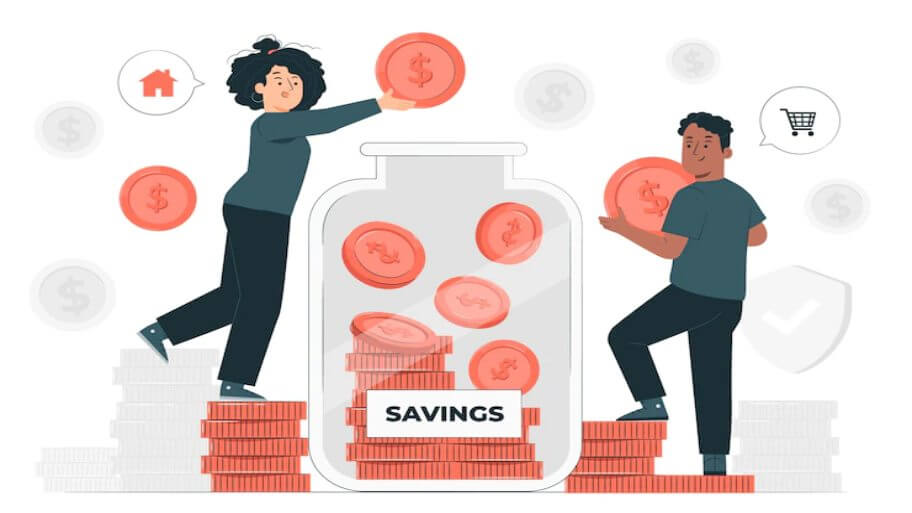The vast majority of individuals have a single savings account. They haven’t given any attention to how expanding to another location may improve their business. Financial experts, however, highlight the need to have various savings accounts to better manage one’s finances and save money. Many individuals have trouble keeping their money under control. You need not accept membership in their group. One strategy that might be useful in this direction is keeping different bank accounts.
Different Accounts Simplify Budgeting and Saving
Having many bank accounts facilitates budgeting and saving by providing a central location for all financial transactions. It is essential to your financial well-being to create a monthly budget. Having two separate bank accounts is a simple approach to controlling spending. Your regular monthly spending and savings may be kept in separate accounts. Never withdraw from your savings account; use the spending account for all your spending needs.
Both accounts might be opened at the same bank or at different banks. Both choices come with their share of benefits and cons. If you have all of your accounts at the same financial institution, transferring money between them is quick and easy. Your paychecks may go straight into your savings account. Then you can transfer your allotted spending money into your checking account. Since they are connected, you may easily add money to any account in the event of an unexpected expense.
But this convenience might end up sabotaging your best financial efforts. Overspending is more likely if more funds are only a mouse click (or smartphone touch) away. If sticking to your budget is challenging, one strategy to try is to manually deposit budget cash into an account at a different bank.
Increase Your Income Quickly by Using a Savings Account
The interest rates on certain types of specialist savings accounts are relatively high. That gives you a safe method to get decent interest on the money you were planning to keep in the bank. Money market accounts and high-interest savings accounts are two common choices. Although they often come with restrictions, these savings vehicles provide the highest rates that banks now offer.
There can be a minimum deposit or balance criteria for the highest possible return on your money. To add insult to injury, several of these accounts restrict your capacity to make withdrawals or conduct other financial operations. These characteristics make them great for putting away money but not spending it. As a result, you may find it convenient to set aside some money in a standard bank account to make routine expenditures. Then, you may put your funds into a second, high-interest savings account.
Some Important Factors to Take into Account for Couples
Separating finances into “your money,” “my money,” and “our money” is a common practice among married couples. The most typical method involves dividing the cost of housing, food, utilities, and other common expenditures between roommates and then paying for everything out of a single joint account (called “our money”). Put your own spending money in the “my money” account. Your spouse or partner may do the same with their own account.
As a general rule, couples fight and argue about money more than any other topic. This is avoided when money is divided into the three categories given. Identifying whose funds are whose and whose account should be utilized for which purchases is a breeze. This method not only helps with family economics but may also assist in preserving the peace. In addition to a combined savings account, you may also choose to maintain individual savings accounts.
Why are Emergency Funds Important?
The difference between being financially stable and going bankrupt may be found in emergency savings, sometimes known as contingency reserves or rainy-day money. Put aside at least 5% of your paycheck into savings in case of an unexpected expense. Always have some on hand to pay for those unforeseen costs that crop up. An emergency fund provides essential protection for millions of individuals who do not have any savings and must get by from paycheck to paycheck. It ensures that you will always have some cash on hand.
If you want to be safe, you should put some cash away in a separate account. Keep your emergency savings and everyday spending money in the same account. It might be difficult to tell the difference between them. To avoid being tempted to spend your emergency savings before you need to, separate them.
Conclusion
The correct number of savings accounts varies from person to person. One area where generalizations don’t work is financial advice since everyone’s circumstances are unique. Conventional thinking says that you should always have two separate bank accounts. Use one for everyday expenses and the other for savings.
Finding the lowest possible interest rates has never been easier than with the help of online tools. Find out what services and products are available to customers in your region by doing a location-based search. The next step is to examine and contrast the different deals. It’s essential to remember that there are other considerations than interest rate to take into account. The income you receive on certain savings accounts may be nullified, or even reversed, by the fines and levies imposed on account holders who transgress the terms of the account. You should also only deal with banks approved by the FDIC or a similar organization.

Featured Image: Freepik © storyset






